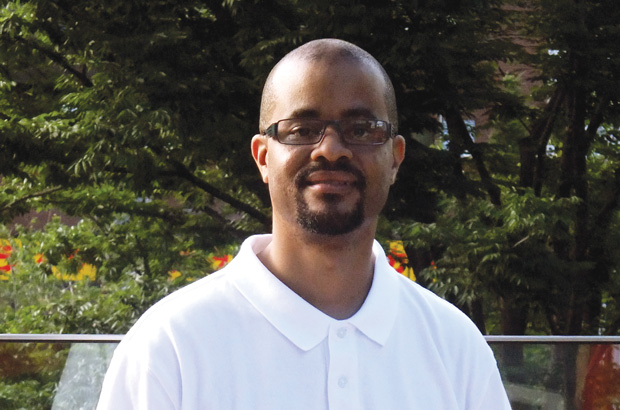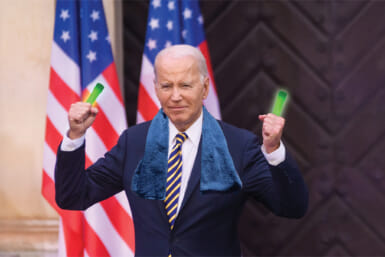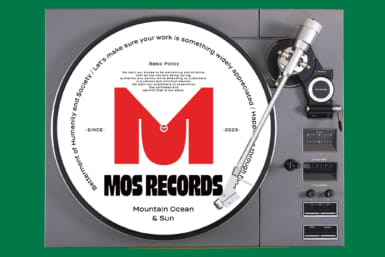An interview with legendary Detroit House DJ Terrence Parker
Though Terrence Parker came out of the Detroit Techno scene, the long time DJ is best known for his soulful brand of House music.
Parker got a full education in the developing sounds of the 1980s by hanging out at Buy Rite Records in Detroit, where he regularly picked up promos from Detroit Techno founders like Derrick Mays, Kevin Saunderson and Juan Atkins, which he would play on his own radio show. Though he started out as a Hip-Hop DJ, Parker quickly gravitated toward the House sound when he started producing his own tracks that combined a love of true song structure and the influences of a very musical home life.
On a sunny summer afternoon at the Virgin Cafe in Osaki, The Weekender spoke to Parker — known to some as the Telephone Man cause he uses an old telephone instead of headphones – when he was in town for a couple deep sets. In a wide ranging interview, the Detroit House legend covered the origin of the Detroit scene, his personal style and the joy of DJing in Japan
How do you like playing Japan?
My last visit here was six years ago, and I have been all over Europe DJing in a lot of different places, but Japan is my favorite place to play. It’s just the vibe here, the people really respect what you play. It’s like being a chef, you cook a meal and some people are just like, “Whatever.” But here, it’s like the people really savor it, they are are like “Ummm.”
What was the DJ scene like when you started out?
In terms of Techno, House, and even into disco and some of the funk stuff, it was just beat matching. But I started many many years ago as a Hip-Hop DJ, so there was the whole idea of mixing, scratching, movement. And then as House music developed in the mid 1980s, I was so captured by the music and the style. And it wasn’t just House, it was a blend of House and the Detroit Techno that was developing at the time. It wasn’t like now, where you can easily tell the difference between House and Techno — back then you could listen to a House record from Chicago and a Techno record from Detroit and the two were very similar in sound, the only differences were very subtle.
‘We used Kraftwork, who had these very simple but funky baselines in their tracks that were very rhythmic and syncopated’
What were the differences?
Chicago was calling it House because it was built around the Warehouse, which was famous club in the city. In Detroit it was Techno because it was based more along the idea that it was “technological” music, or forward-thinking music and all the instrumentation was electronic. That blended with the production side of it – it being Motown, there were a lot of people in the automotive industry, and there is a certain way you work when you are on the line at GM or Chrysler or Ford, there is a rhythm or a pattern to it. It was the same type of thing when they produced the music, there was a rhythm or a pattern to produce each one of these songs. So that — along with the idea that it was forward-looking and the technical aspect of it — that’s how they came up with Techno, and of course the Detroit aspect, that made it Detroit Techno.
It seems like at the same time, there were two very different styles that came out of Detroit itself.
It’s interesting, the early Detroit records were very much like House, there were only slight differences in some of the instruments we used. The music was very close, you could play early House and Techno in the same set and people wouldn’t really care too much, ‘cause it’s just music. We used Kraftwork, who had these very simple but funky baselines in their tracks – dun dun, dun Dun dunt, dun Dun dun da dun – that were very rhythmic and syncopated like in tracks by Georgio Morader.
In Detroit, we were very influenced by those types of sounds, but then also by Parliament, Funkadelic, James Brown, and Motown sounds like The Funk Brothers. We took bits and pieces from all those and put them into our own music. You also had this idea of almost like evolution, if you will, where it started off like simple melodies and then developed into full song structures, with the verse, chorus, the verse, then the bridge.
Now, people like Drexciya and “Mad” Mike Banks from the label Underground Resistance, they all came from the same camp of “We are just making tracks, no song structure” — which was like a rebellion against song structure. So you got structure, melodies, songs here; and over here, you just got funky, aggressive, underground tracks. Maybe you would have some vocals, but they were just like stabs.
‘Herald Melvin and the Blue Notes to the Jackson 5 to Dinah Ross and the Supremes, The Four Tops … Nina Simone Dave Brubeck, this was what I grew up on’
Where did you fit in?
Ooh, I was just the young guy watching. I used to get promos from Derrick Mays ‘cause at those times I was a local DJ. We had a local music shop called Buy Rite Music, and we knew the new records came in every Thursday. So that was when everyone would go there to meet, and these producers, like Derrick and Kevin and Juan and Eddie Fowlkes, all these guys knew that you could get promos to all the DJs at one time.
They would come and hang out, and while you were there, they would be like, “Here’s the White Label promo, the new release …” whatever. It was a great time to get the promos, ‘cause I would play them on the radio show. I was also doing a little producing of my own, and I wanted to be like these guys. I got some excellent advice from my father, he said that if you want to do something in your life, find the people who are already doing it and align yourself with them. Even if you can’t connect directly, pay attention to what they are doing, see how they operate and learn from them, then you can emulate what they are doing and add your own style to it.
The owner of Buy Rite was a guy named Cliff Davis, and Cliff actually produced records for Kevin, Derrick, Juan, Ed Fowlkes, Blake Baxter, and he was known for having this little label called Express Records. Being a DJ and listening to music and doing my own simple little productions, from time to time I would slip them my own demo and say, “Thank you guys for the promos, but here’s a track that I’ve been working on.” And to make a long story short, myself along with Robinson, most people know him as Trackmaster Lou, we had developed a group called Scan 7. But at that time, myself, Robinson and a guy, Mark Kinchen, know as MK, we got together as Other Minds and submitted a demo to Cliff Davis for Express Records and he loved it. In fact, he was playing it at the shop one afternoon, and the DJs where all like, “Yeah I like this, where can I get it,” and that’s when Cliff, was like “Maybe I should put this out.”
What kind of style was that?
I was definitely leaning more toward the House side. I was more into the musicality, in terms of song structures, having chords, progressions, everything that makes a song a song. I like melodies, vocals and harmonies. I grew up in a house were my parents were playing Motown and Philly soul, so I heard everything from Herald Melvin and the Blue Notes to the Jackson 5 to Dinah Ross and the Supremes, The Four Tops. But my dad was also a big Jazz buff, so we had Nina Simone — I mean we had all kinds of stuff — Dave Brubeck, and this was what I grew up on. There was this mix of Jazz, Soul, R&B and Gospel Music as well, anything from The Staple Singers to The Wayans and Shirley Caesar. My dad even had all the records of Mahalia Jackson, the big old thick records, you know, where you can’t even bend them? So even though I love Techno and these tracks, my love or my desire was always to go the direction that I saw Kevin Saunderson or Juan Atkins going, which was more towards song structures than just making tracks.
Tell us about the Jamie Foxx Sample on “Love Gets Me High.”
I got it right off the television, very old school. Foxx is actually singing “Love Won’t Make Me Wait.” Dion Warwick and Luther Vandross are famous for singing it. It’s a classic song, Burt Baccarat. Jamie Foxx is doing this stand up, and he sits down at a piano and he starts playing it, and my wife and I were blown away, ‘cause here’s this comedian and he has an amazing voice — hidden talents you know. But then I am listening to it, and I am a musician, so I am always thinking, how can I take this and incorporate it into something that I am doing? And I thought that, wow, if I could use a piece of this. So just recorded the program off the TV and sampled it off the tape, and initially I just started and playing around with it. I cut it into pieces, ‘cause if you listen, he is singing “Love Won’t Make Me” wait, but I completely changed the sentence.
There is a deep story behind that track. I was in one of the deepest depressions of my life. About two months before I made that track, one of my real good friends, he killed himself, he just committed suicide. He was a music guy also, his name was Brian Coleman, really talented, but he had a lot of problems, and we got a call one day and it was like man he was gone. So after the funeral I was real down, with a lot of stuff on my mind, and music was always my way to escape things. Music was kind of like my drug – some people drink alcohol or take drugs – but for me it was always music. So I went into my studio and I had these Jamie Foxx samples, and I literally stayed in there for hours and played with them. And that’s how I know that something beautiful can come out of something terrible.
When I finished the song, I let a few few friends hear it, and they were like “Yeah, ok.” But it wasn’t even maybe 30 days after I released it, that I started getting calls from the Netherlands and France and people were like, “This record is doing really well,” and I was checking out the sales numbers, like “Wow!” And then, within two months after I released it, it hit Holland’s top-30 mainstream pop chart, and it was up there with Whitney Huston and whatever, and the song peaked at around No. 12 in October ’96.
External Links:
Detroit Techno House
Terrence Parker Home Page









